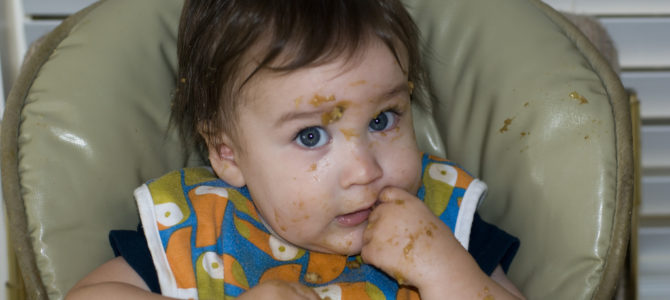
As peanut allergies became increasingly common in the United States, some well-meaning doctors began to advise parents not to expose allergy-susceptible kids to peanuts until age three. Turns out that was precisely the worst advice docs could have given, as research now indicates exposure by age four to six months — the earliest most babies start eating solid foods — dramatically reduces a child’s likelihood of contracting such an allergy.
A “landmark” clinical trial recently found that parents could reduce by 80 percent a susceptible child’s risk of later developing a peanut allergy if they introduced foods with peanut butter to their babies as early as four months of age. Babies are considered at risk for developing a peanut allergy if they have severe eczema or an egg allergy.
In response, this January the National Institutes for Health advised parents to introduce peanut butter — not peanuts, a choking hazard — to babies essentially as soon as they start eating solid food. If the child is at risk for allergies, NIH says parents should introduce peanut butter in conjunction with advice from their doctors about a possible allergen test first or even introduce the food in the doctor’s office. Last week the Food and Drug Administration issued a similar recommendation.
“Even if our own children don’t have a peanut allergy, most of us have friends or relatives whose children do. That’s not surprising, given that the prevalence of peanut allergy has more than doubled in children from 1997 to 2008 alone. Today, about two percent of American children are allergic to peanuts,” said FDA Commissioner Scott Gottlieb in a press release.
While the FDA says this recommendation is based on one, albeit large and quality, study, studies have been finding similar results for some time. Six years ago our pediatrician advised us to give our first baby a wide variety of foods as soon as he started eating solids (which was early — he was a voracious pudgebucket), including nuts and dairy, because of studies showing Israeli kids have almost no nut allergies.
Why? Turns out peanut butter is an ingredient in a very popular Israeli snack often used as a teething biscuit. Studies in the New England Journal of Medicine and Journal of Allergy and Clinical Immunology, among others, have found that early exposure to potential allergens actually reduces the development of allergies. Other studies have found that when a pregnant mother eats dairy, wheat, and peanuts, her baby is less likely to develop childhood allergies to these foods or asthma. Same for if the baby himself eats these foods early.
There’s good news also for kids who already suffer from a peanut allergy: A new Australian clinical trial may have found a cure. Chase Purdy reports at Quartz:
Rather than avoid the allergen altogether, the researchers designed a treatment that combined a probiotic with peanut oral immunotherapy to trigger an immune system response. The hope was that the immune system would reprogram its response to peanuts and—over time—develop a tolerance to the allergen.
The approach worked for 82% of the 48 children who were given the treatment daily for 18 months in 2013. Now, four years later, the majority of those children are still able to consume peanuts in their diets without adverse reactions, according to the research, which was published this week in The Lancet Journal of Child and Adolescent Health.
All these findings have lots of implications for the mommy and health wars, especially if subsequent studies strengthen them for other foods besides peanuts. Allergy levels have been growing in the United States, and are twice as prevalent among children now as they are among adults, causing plenty of practical headaches in child-heavy places such as schools and daycare. Just about every mom is now familar with being prohibited from giving her kids trail mix or a good ol’ PB&J in a packed lunch because one kid among 30 in her child’s class or sports team is allergic to nuts. Besides the human misery and anxiety an allergy cure could bring, which is of course the most important effect, it could bring relief for the social costs these allergies inflict.
Not only that, the rising prevalence of allergies has fueled the anti-vaccination movement, which frequently notes — despite the important difference between correlation and causation and the lack of corroborating evidence — that allergies have grown in tandem with childhood vaccination levels. Major health institutions like the FDA and NIH have damaged their credibility by pushing ideas about health that later turn out not to be true, such as the infamous food pyramid, decades of warnings against cholesterol and fat, and recommendations that parents withhold peanuts until kids are three.
All of these, and many other government health recommendations over the years, have ultimately turned out to worsen the very problems they were supposed to be alleviating. So it’s no wonder that many parents have started to tune out such recommendations and look skeptically on “new and improved” scientific findings that contradict their instincts and preferences. So we moms crowdsource our decisions about when and what to introduce our babies. That only works as well as the quality of your crowd’s information. Luckily, our pediatrician gave us reliable advice at a time when her peers were doing otherwise, and our kids have no allergies. Ideally, however, such happy outcomes could rely on a little more than luck.









